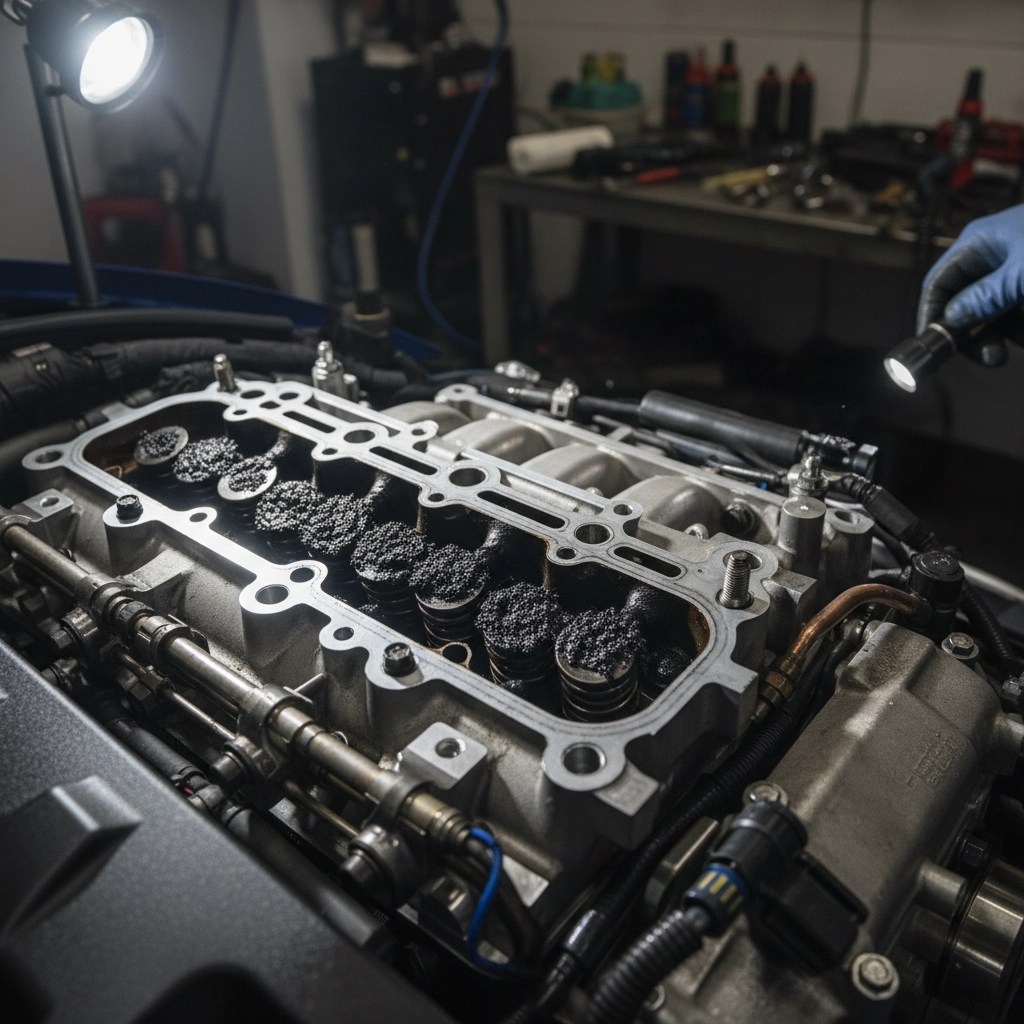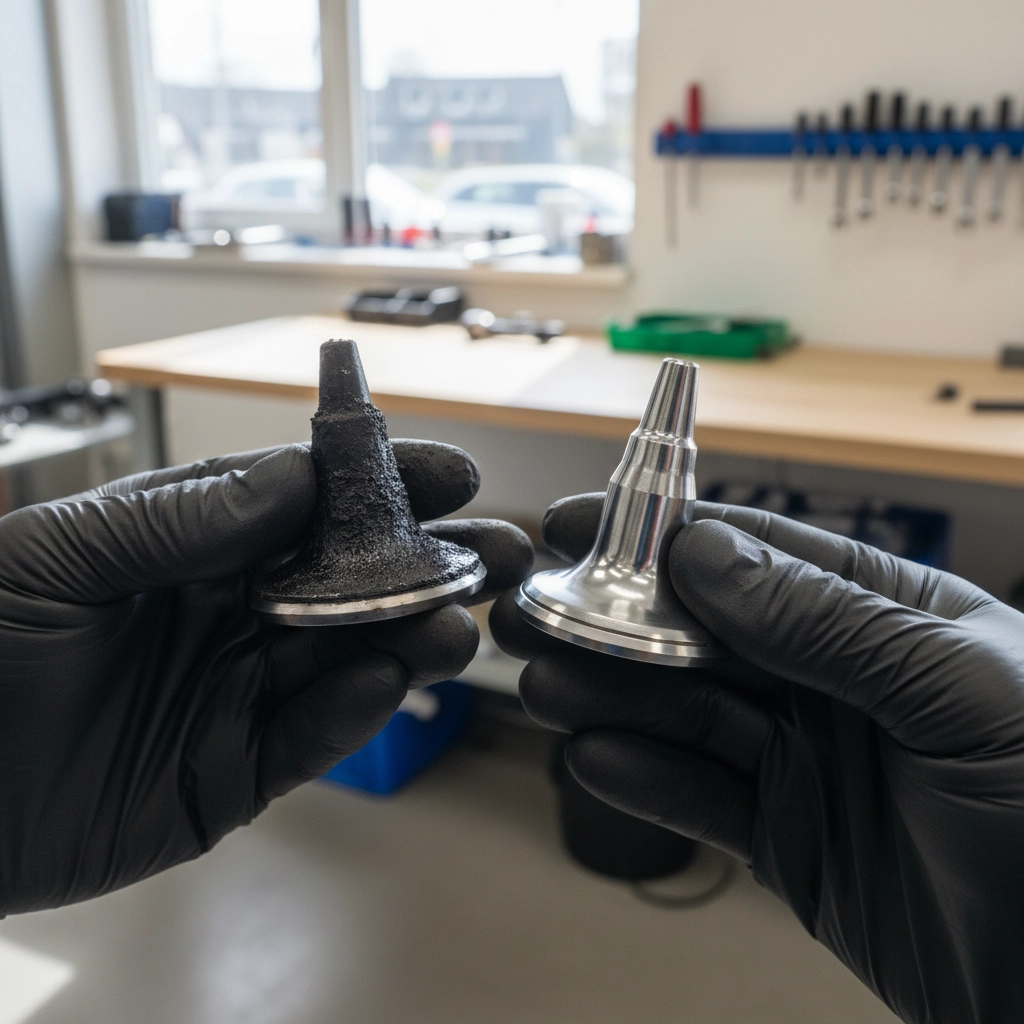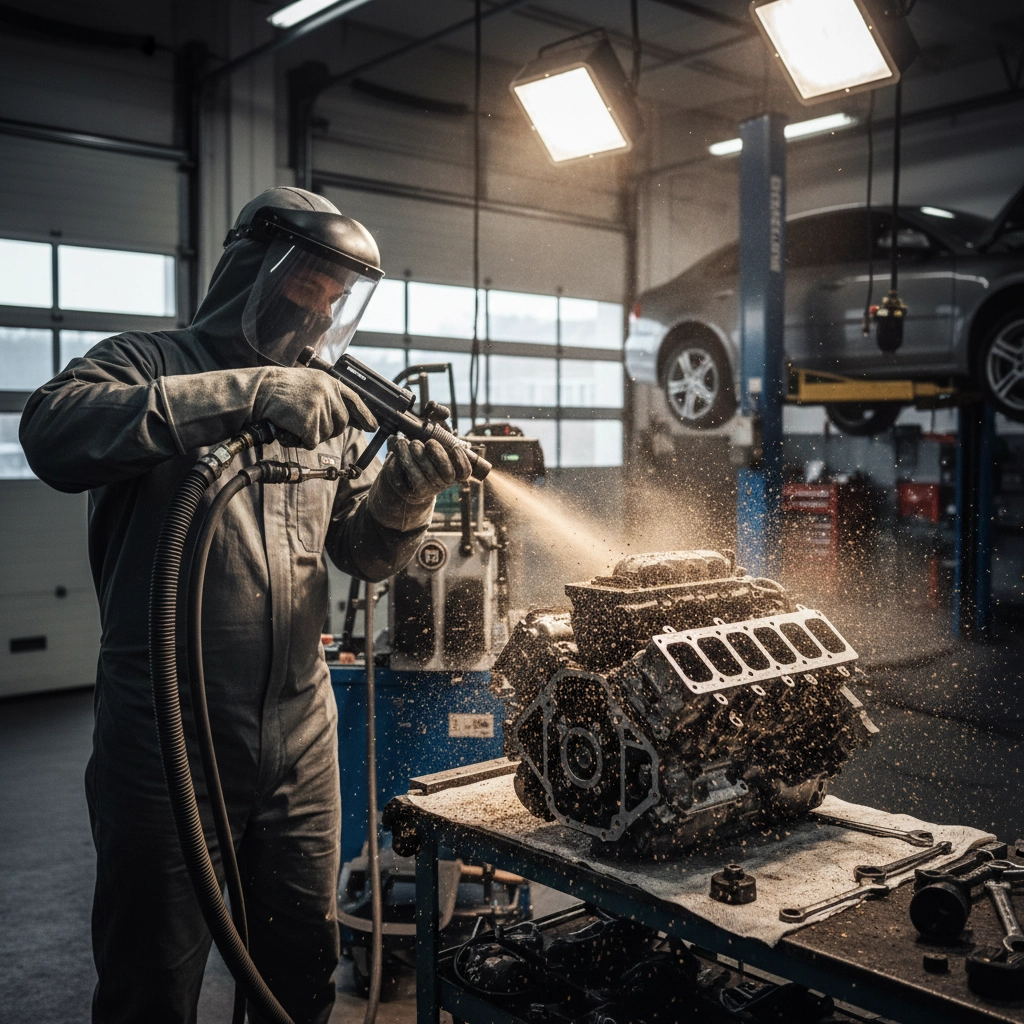I can confidently say that after years of working on Audis in Doylestown, carbon buildup is one of the most misunderstood performance killers affecting these German luxury vehicles. From my experience, most Audi owners don't realize their car's decreasing performance isn't just normal aging: it's likely carbon deposits slowly strangling their engine's ability to breathe.
Let me share what I've learned about this common issue and how you can protect your investment.
What I've Discovered About Audi Carbon Buildup
I've been researching carbon buildup extensively, and I've found that it's directly related to Audi's advanced direct fuel injection technology, particularly in FSI (Fuel Stratified Injection) engines that have been standard since 2004. In my experience working on these vehicles, the problem stems from a fundamental design difference.
Unlike older port injection systems where fuel continuously washes over the intake valves, direct injection sprays fuel directly into the combustion chamber. I've learned that this means the intake valves miss out on that natural cleaning benefit, allowing oil vapors and combustion byproducts to accumulate as hard carbon deposits over time.
From what I've observed, the culprit is the Positive Crankcase Ventilation (PCV) system, which channels small amounts of oil vapor and combustion residue into the intake manifold. Without regular fuel washing these surfaces, I've seen these materials literally bake onto the intake valves, creating increasingly thick deposits that choke performance.

How I've Seen Carbon Buildup Destroy Audi Performance
In my experience, when carbon deposits accumulate on intake valves, they create a domino effect of performance issues that many Doylestown Audi owners mistake for normal wear and tear.
Power Loss That Creeps Up On You
I've found that as carbon clogs the intake valves, less air reaches the combustion chamber, limiting the fuel-air mixture needed for complete combustion. From my observations, owners first notice sluggish acceleration and loss of responsiveness, especially at higher RPMs. What was once smooth and powerful performance suddenly feels underwhelming, and I believe many drivers adapt to this gradual decline without realizing what's happening.
Fuel Economy Takes a Hit
I can confidently say that restricted airflow and inefficient combustion forces your engine to work harder to produce the same power output. From what I've learned, this translates directly into consuming more fuel per mile. I've seen many Audi owners puzzled by mysteriously dropping mileage, and in my experience, carbon buildup is often the hidden culprit.
Rough Running and Misfires
I've discovered that carbon deposits can prevent intake valves from closing properly, allowing combustion gases to escape into the intake manifold and compromising compression. In my experience, this leads to rough idling, hesitation during acceleration, and engine misfires that make the entire driving experience frustrating.
Long-Term Engine Damage I've Witnessed
From what I've learned through years of diagnosis, if left untreated indefinitely, severe carbon buildup can cause intake valves to lose their sealing ability entirely. I've seen this result in significant compression loss and eventual serious engine damage that costs thousands to repair.
Warning Signs I Always Tell Audi Owners to Watch For
I've been there myself: noticing subtle changes in how my car runs but dismissing them as normal. From my experience, these are the early warning indicators that carbon cleaning is needed:
- Shuddering or loss of power while driving, or unexpected stalling
- Check Engine Light appearing on your dashboard
- Decreased fuel economy with more frequent fill-ups than normal
- Rough or uneven idling that wasn't there before
- Sluggish acceleration or hesitation when applying throttle
- Engine misfires or the car running less smoothly overall
I can confidently say that even if you're not experiencing obvious symptoms, carbon buildup is still accumulating in your engine due to the nature of direct injection technology. I've learned that prevention is always more cost-effective than waiting for problems to develop.

My Proven Prevention Strategy for Doylestown Audi Owners
While I've discovered that carbon buildup is inevitable in Audi direct injection engines, I believe you can significantly minimize the problem with deliberate maintenance habits that I recommend to all my clients.
Oil Changes: Your First Line of Defense
I've found that clean oil is absolutely critical in fighting carbon buildup. From my experience, regular oil changes reduce the amount of oil vapor entering the intake system through the PCV system, directly minimizing carbon accumulation. I personally recommend sticking to Audi's maintenance schedule religiously, and I've seen the difference it makes in long-term engine health.
Premium Fuel: An Investment That Pays Off
In my experience, premium fuel contains detergents that help reduce carbon deposits in the combustion chamber. While more expensive, I believe premium fuel prevents carbon buildup more effectively than lower-grade options. From what I've observed, the extra cost at the pump is minimal compared to carbon cleaning services down the road.
Drive It Like You Mean It (Sometimes)
I've learned that taking your Audi on highway trips or spirited drives at higher RPMs and temperatures can actually help your engine. From my observations, extended periods of sustained airflow at decent speeds help blow through some accumulated buildup naturally. However, I've found that short trips and city driving don't generate enough heat and airflow to provide this cleansing effect.
Professional Maintenance: My Non-Negotiable Recommendation
I can confidently say that regular professional maintenance and carbon cleaning should be part of your Audi service schedule. From my experience, this proactive approach is far less costly and time-consuming than dealing with severe performance issues or engine damage later.

Professional Solutions I Trust and Recommend
I've researched various carbon cleaning methods extensively, and I believe the most effective approach for removing existing carbon buildup is professional manual removal.
Walnut Shell Blasting: The Gold Standard
From what I've learned, the most thorough approach is walnut shell blasting, which uses crushed walnut shells to gently but effectively blast away carbon deposits from intake valves and ports. I've seen this method restore engines to like-new performance levels. However, I always tell clients that walnut blasting isn't routine maintenance: it should only be performed when buildup has reached significant levels.
Professional Diagnosis I Recommend
In my experience, professional technicians can inspect your intake air sensor to quickly assess whether you need cleaning. I've found that a visibly carbon-coated sensor indicates buildup has progressed to the point requiring professional intervention.
Why I Believe Prevention Beats Reaction Every Time
I've learned that carbon buildup is a known characteristic of modern Audi direct injection engines, not a defect or failure. From my experience working with Doylestown Audi owners, I can confidently say that consistent preventative maintenance: regular oil changes, quality fuel, periodic spirited driving, and professional cleaning when needed: keeps these vehicles performing at their best.
I believe the key is understanding that this isn't a problem you can ignore and hope goes away. From what I've observed, proactive maintenance prevents the performance degradation and costly repairs that severe buildup inevitably causes.
Take Action Before Carbon Buildup Takes Your Performance
If you're experiencing any of the warning signs I've mentioned, or if it's been more than 60,000 miles since your last carbon cleaning service, I recommend scheduling a diagnostic assessment. From my experience, early intervention saves money and keeps your Audi running the way it was designed to.
Don't let carbon buildup slowly steal your Audi's performance and efficiency. Call us at 267-279-9477 to schedule your carbon buildup assessment, or visit www.DoylestownAutoShop.com to book your appointment online. I've seen too many Audis suffer from neglected carbon issues: let's make sure yours isn't one of them.